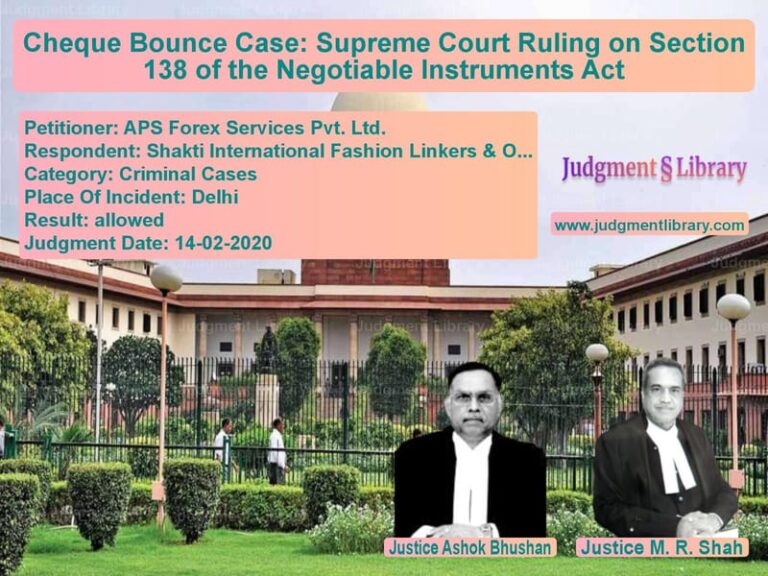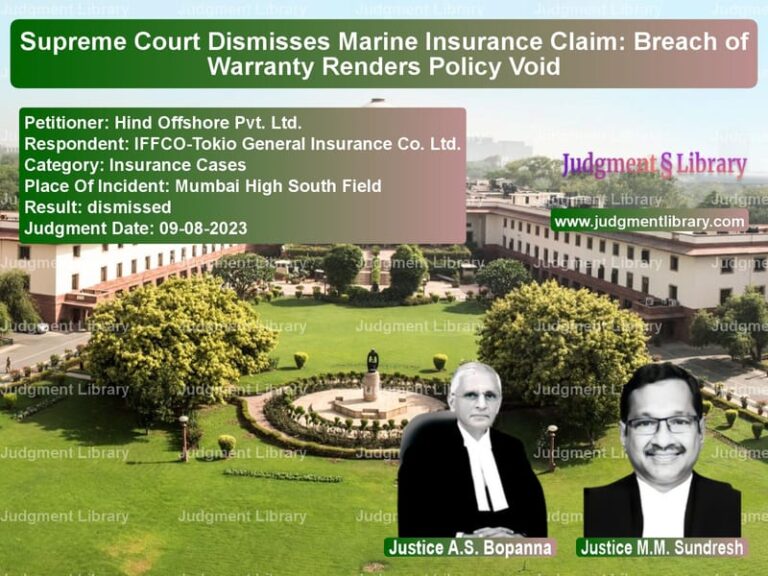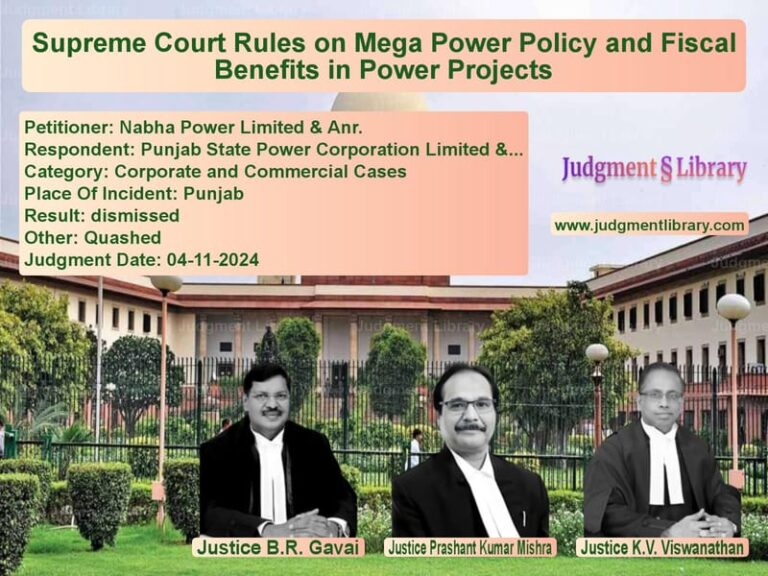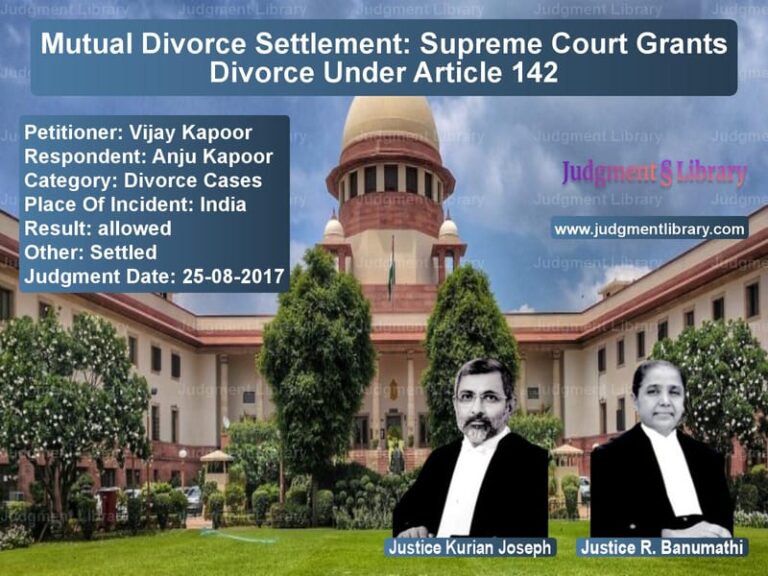Supreme Court Cancels Bail in NDPS Case: Failure to Satisfy Legal Conditions
The case of The State of Meghalaya v. Lalrintluanga Sailo & Anr. revolves around the interpretation and application of Section 37 of the Narcotic Drugs and Psychotropic Substances Act, 1985 (NDPS Act). The Supreme Court, in its judgment dated July 16, 2024, set aside the High Court’s order granting bail to the respondent-accused, ruling that the bail was granted without satisfying the mandatory conditions under Section 37.
The judgment emphasizes the stringent nature of NDPS laws, the necessity of proving innocence before bail can be granted in commercial quantity drug cases, and the importance of ensuring that judicial discretion aligns with statutory mandates.
Background of the Case
The respondent, referred to as ‘Smt. X’ due to being HIV positive, was charged under Sections 21(c) and 29 of the NDPS Act in two separate cases. She was first arrested on March 16, 2023, in connection with FIR No.22(03)2023 and was later formally arrested on April 11, 2023, in connection with FIR No.06(02)23. The High Court of Meghalaya granted her bail on June 27, 2023, in one case and later on September 29, 2023, in the other case.
Key Facts
- The accused was arrested for possession of a commercial quantity of heroin (1.040 kg).
- The High Court granted bail solely on humanitarian grounds, considering the accused’s HIV-positive status.
- The State of Meghalaya challenged the bail order, arguing that the High Court failed to satisfy the mandatory conditions under Section 37(1)(b)(ii) of the NDPS Act.
- The Supreme Court noted that the accused had failed to appear in court despite being granted bail.
Arguments by the Petitioner (State of Meghalaya)
The State of Meghalaya contended:
- The High Court ignored the twin conditions under Section 37(1)(b)(ii) of the NDPS Act, which require the court to be satisfied that the accused is not guilty and is unlikely to commit any offense while on bail.
- Possession of 1.040 kg of heroin is significantly above the commercial quantity threshold, warranting stricter scrutiny.
- The accused was a repeat offender, involved in multiple cases under the NDPS Act.
- Granting bail without evaluating the case’s merits set a dangerous precedent.
Arguments by the Respondent
The respondent, represented by her son, argued:
- She was granted bail earlier on medical grounds due to being HIV positive.
- There was no direct evidence linking her to the drug trade.
- The High Court correctly exercised its discretion in granting bail.
- Humanitarian concerns should outweigh the strict application of Section 37.
Supreme Court’s Observations
The Supreme Court examined the legality of the bail order and whether the High Court adhered to the requirements of the NDPS Act.
1. Stringency of NDPS Act
The Court reiterated that the NDPS Act was enacted to combat drug-related crimes and includes strict provisions for bail.
“An act to consolidate and amend the law relating to narcotic drugs, to make stringent provisions for the control and regulation of operations relating to narcotic drugs and psychotropic substances…”
2. Mandatory Compliance with Section 37
The Court emphasized that Section 37(1)(b)(ii) mandates that for an accused to be granted bail in commercial quantity cases, the court must be satisfied that:
- The accused is not guilty of the offense.
- The accused is not likely to commit any offense while on bail.
The Court ruled:
“Satisfaction of the twin conditions under Section 37 of the NDPS Act is a sine qua non for granting bail to an accused. A liberal approach ignoring the mandate of Section 37 is impermissible.”
3. No Finding of Innocence
The Court observed that the High Court failed to record any finding that the accused was not guilty of the offense or that she was unlikely to reoffend.
4. Absence of Judicial Scrutiny
The Court found that the bail order relied solely on the accused’s medical condition without considering the severity of the offense.
5. Precedents on NDPS Bail Cases
The Court cited State of Kerala v. Rajesh (2020), where it was held that:
“The exercise of power to grant bail in NDPS cases is subject not only to the limitations under Section 439 CrPC but also to the additional limitations under Section 37(1)(b)(ii).”
Supreme Court’s Final Verdict
The Supreme Court ruled:
- The High Court’s bail order dated September 29, 2023, was set aside.
- The accused was directed to surrender within one week.
- If she failed to surrender, she would be taken into custody immediately.
- The trial court was directed to cancel the accused’s bail bond and discharge the sureties.
- The trial court was instructed to expedite the trial under Section 34(2) of the HIV/AIDS (Prevention and Control) Act, 2017.
Conclusion
The Supreme Court’s decision in The State of Meghalaya v. Lalrintluanga Sailo & Anr. reinforces the strict bail conditions under the NDPS Act. The ruling ensures that bail in serious drug-related cases is granted only when statutory conditions are met, preventing judicial overreach and safeguarding the integrity of anti-narcotics enforcement.
Petitioner Name: The State of Meghalaya.Respondent Name: Lalrintluanga Sailo & Anr..Judgment By: Justice C.T. Ravikumar, Justice Prashant Kumar Mishra.Place Of Incident: Meghalaya.Judgment Date: 15-07-2024.
Don’t miss out on the full details! Download the complete judgment in PDF format below and gain valuable insights instantly!
Download Judgment: the-state-of-meghala-vs-lalrintluanga-sailo-supreme-court-of-india-judgment-dated-15-07-2024.pdf
Directly Download Judgment: Directly download this Judgment
See all petitions in Drug Possession Cases
See all petitions in Bail and Anticipatory Bail
See all petitions in Legal Malpractice
See all petitions in Judgment by C.T. Ravikumar
See all petitions in Judgment by Prashant Kumar Mishra
See all petitions in allowed
See all petitions in Quashed
See all petitions in supreme court of India judgments July 2024
See all petitions in 2024 judgments
See all posts in Criminal Cases Category
See all allowed petitions in Criminal Cases Category
See all Dismissed petitions in Criminal Cases Category
See all partially allowed petitions in Criminal Cases Category







